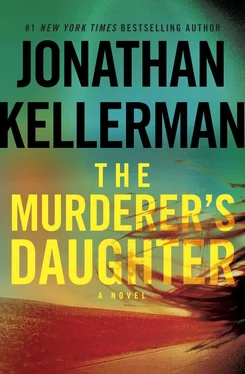On the morning of the fifteenth day after It Happened, Gardener showed up again and Grace supposed she could tolerate him. She cracked the door. Mike Leiber was with him and suddenly Grace didn’t feel like letting either of them in.
“Yes, Ransom?”
“You all right, dear? Haven’t heard from you.”
“I’m coping.”
“Yes... we’re all struggling to cope — may we chat for a moment?”
Grace hesitated.
“It’s important,” said Gardener.
Grace didn’t reply and Gardener edged closer. “I promise not to get all soppy, Grace. Sorry if I took advantage of your tolerance.”
Behind him, Mike Leiber stared into space. Grace wanted to hit him.
Gardener said, “Please, Grace? It’s for your sake. Matters that absolutely need to be dealt with.” Sounding like a lawyer again. Mike Leiber’s eyes remained flat as pond pebbles.
Gardener put his hands together, as if in prayer.
Grace undid the chain.
She led both men to her kitchen where Gardener placed a large crocodile-hide briefcase on the table and drew out a pile of documents. Leiber seated himself facing Grace but turned away immediately and busied himself with her refrigerator door. A host of diagnoses sprang into Grace’s mind. She blocked them. Who cared?
As Gardener arranged his papers, he wrinkled his nose. The room smelled of stale grease. She’d survived on forgotten food foraged from her cupboards and fried things she often burned — crap she’d normally shun. She hadn’t aired the kitchen out. Hadn’t showered for two days.
Gardener said, “Okay,” and squared the edges of the two-inch stack he’d created. “As you may have suspected, you’re Malcolm and Sophie’s sole heir.”
“I didn’t suspect. I haven’t thought about it at all.”
“Yes... of course — I’m so sorry, Grace, this is... but in any event, things need to be dealt with and here we are. You are the sole heir. Thus, you need to be apprised of your new situation.”
“Okay. Apprise me.”
Mike Leiber said, “It’s more than okay.”
Grace shot him a sharp look. He was already back studying the white expanse of fridge.
“Well, yes,” Ransom Gardener said. “What Michael is saying, Grace, is that Sophie and Malcolm were extremely wealthy, you are the beneficiary of a combination of Sophie’s own inheritance and years of prudent investing undertaken since Sophie and Malcolm’s marriage.” He glanced at Leiber.
Leiber shrugged.
“Michael here is somewhat of a financial mastermind.”
“Load of crap,” said Leiber. “Buy low, sell high, avoid stupidity.”
“You’re being overly modest, Mike.”
Leiber crossed his arms over his chest and got that blank look in his eyes again. Suddenly, he sprang up, “Gotta go. Catch some foreign exchanges.”
“I drove,” said Gardener. “How will you get back to the office?”
“Bus,” said Leiber. To Grace: “Sorry you had to learn this way. Hope you don’t fuck it up.”
When he was gone, Gardener said, “As you’ve obviously noted, Michael’s an unusual individual. His years at MIT were rough. Malcolm helped him.”
Grace sat there.
“Then again,” said Gardener, “you’re probably not surprised by that — by anything I could tell you about Malcolm or Sophie... so... here are the details.”
For all his initial babbling, Gardener was able to transition to pure lawyerly efficiency, communicating the facts with admirable clarity.
The house on June Street was worth between three and a half and four million dollars. The stock fund Malcolm and Sophie had set up for Grace within months of adopting her had grown to five hundred seventy-five thousand dollars.
“The fund is all yours, now, but some of the proceeds from selling the house, should you choose to sell it, will go to taxes. If we use every arrow in our quiver, my estimate is you’ll end up with four mil, give or take.”
Grace said, “Fine, I’ll pay you to do the paperwork.”
“I’ve already begun, dear. I’m already the executor, no additional fees projected.”
“Don’t executors bill by the hour?”
“No set rules, Grace.”
“I don’t need a handout—”
“That’s not what this is, Grace, it’s basic decency, I can’t tell you what they meant to me.”
Worried he’d lapse into more nostalgia, Grace said, “Thank you.” She’d buy him a gift, something extravagant. In his house, the day of the funeral, she’d noticed a collection of art deco glass. His wife stroking a vase as she walked by.
Gardener made no attempt to move.
Grace said, “Anything else?”
Gardener gave a sad smile. “As they say on those commercials for cheap knives, ‘But wait, there’s more.’ ”
Grace closed her eyes. Her nerves were frayed raw, it was all she could do not to shove him out of her kitchen.
“So,” said Gardener, “there’s the four million. Which by itself is a nice boon for someone as young as you, the potential for growth is enormous. But.” He gave a flourish. “There’s also a bit more money that Malcolm and Sophie had invested for themselves. Mike’s done a wonderful job with those funds, too. And before him, his father did the same thing — Art Leiber was one of the premier money managers on the eastern seaboard. Another chum of Malcolm and mine from Lowell. Wonderful man, he passed years ago, bladder cancer. There were questions about Mike’s ability to handle things but he’s proven himself quite nicely.”
Here we go again.
Gardener must’ve sensed her impatience because he drew himself up. “What you’re about to see, Grace, illustrates the power of compound interest. Buying solid investment products and not touching them.”
He breathed in. Plucked three sheets of paper from the pile and slid them across the table.
Columns of stocks, bonds, funds, things Grace knew nothing about. Small-print letters and numbers, everything blurring.
She looked away. “Okay, thanks.”
“Grace!” said Ransom Gardener with alarm in his voice. “Have you seen it?”
“Seen what?”
He snatched up the bottom sheet, reversed it so Grace could read, and jabbed a spot near the bottom.
Grand Total.
Twenty-eight million, six hundred fifty thousand dollars.
Plus forty-nine cents.
“That,” said Gardener, “is after taxes, Grace. You’re a very wealthy woman.”
Grace had read all those lottery-winner stories, people resolving life wouldn’t change. But of course it always did, pretending otherwise was idiocy. No sense ignoring her new circumstances; the key was to make sure she remained in control.
She phoned Mike Leiber and told him she’d be withdrawing some money but wanted him to continue managing the bulk of her fortune as before.
He said, “If you have to spend, use the income, not the principal.”
“What income is that?”
“Don’t you read? You’ve got munis — tax-free bonds. The interest is over six hundred K every year. That enough for shoes and manicures, right?”
“More than enough. So we’ll continue as before?”
“Why not? You don’t care if I don’t do the dog and pony, right?”
“Pardon?”
“For most clients I have to visit twice a year with charts and crap and show what a good job I’m doing. Malcolm and Sophie knew it was a waste of everyone’s time. But Gardener insisted.”
“No need, Mike.”
“Also,” said Leiber, “I’m telling you this at the outset: Some years you’ll do better, some worse, anyone who tells you different is an asshole con man.”
“Makes sense, Mike.”
“You can call if you have questions but your questions are unlikely to be uninformed. Better to read the monthly statements, everything’s spelled out. If you want more, I’ll recommend reading a book on basic investing, Benjamin Graham’s the best.”
Читать дальше












